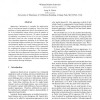223 search results - page 2 / 45 » Least-Squares Temporal Difference Learning |
116
click to vote
NIPS
2001
15 years 1 months ago
2001
We propose a new approach to reinforcement learning which combines least squares function approximation with policy iteration. Our method is model-free and completely off policy. ...
103
click to vote
ICML
2009
IEEE
16 years 17 days ago
2009
IEEE
We consider the task of reinforcement learning with linear value function approximation. Temporal difference algorithms, and in particular the Least-Squares Temporal Difference (L...
PKDD
2009
Springer
15 years 6 months ago
2009
Springer
The goal of approximate policy evaluation is to “best” represent a target value function according to a specific criterion. Temporal difference methods and Bellman residual m...
SIBGRAPI
2009
IEEE
15 years 6 months ago
2009
IEEE
Appearance information is essential for applications such as tracking and people recognition. One of the main problems of using appearance-based discriminative models is the ambig...
87
Voted
NIPS
1998
15 years 1 months ago
1998
Lazy learning is a memory-based technique that, once a query is received, extracts a prediction interpolating locally the neighboring examples of the query which are considered re...

